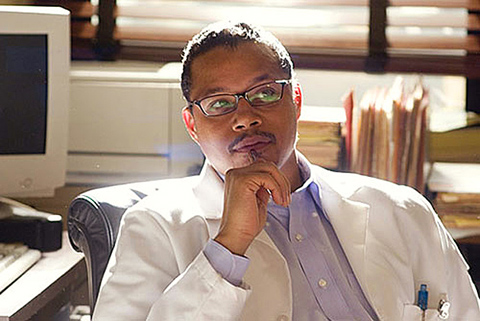Do not believe anything you hear about Awake, do not talk to anyone about it, and above all do not even GLANCE at the poster or ads, which criminally reveal a crucial plot twist. This movie, which was withheld from critics and has scored a pitiful 13 percent on the Tomatometer from those few who were able to see it, is a surprisingly effective thriller. I went to a regular theater to see it Friday afternoon, knowing nothing about it except that the buzz was lethal, and sat there completely absorbed.
The movie involves a very, very rich young man named Clay Beresford (Hayden Christensen), who lives with his loving but dominating mother (Lena Olin) and fears to tell her about his engagement with the beautiful Samantha (Jessica Alba). But “the clock is ticking,” he is warned by his friend and surgeon Jack Harper (Terrence Howard). Jack saved Clay in the ER after he had a massive heart attack, and now Clay’s on the waiting list for a transplant. “Marry that girl,” Jack advises him, and even invites him into the operating room for a trial run to explain how dangerous the surgery is.
This and other medical procedures are highly unlikely, and the heart transplant itself involves an improbably small team, a last-minute replacement as the anesthesiologist and an uninvited visitor allowed to put on a surgical gown and observe. But accuracy is not the point. Suspense is. And from the moment Clay realizes he is not fully under anesthesia and can hear and feel everything that is happening, the movie had me. The character does a voice-over in which he tries to force his eyes open and signal that he’s conscious, and then a series of unexpected developments take place which I will not even begin to reveal.

PHOTO COURTESY OF FORTRESSFILM
Since the movie involves a plot which cannot be discussed, let me just say that I may be the slowest tomato on the meter, but I did not anticipate the surprises, did not anticipate them piling on after one another, got very involved in the gory surgical details, and found the supporting soap opera good, as such things go.
It involves a rich kid who believes he can never live up to his father, a mother who believes she cannot surrender her son, and the beautiful Jessica Alba coming between them. It also involves Clay’s determination to have the transplant performed by Jack, his trusted friend, instead of his mother’s candidate (Arliss Howard), who boasts, “I have had my hands inside presidents.” He wrote the book on transplants and will be the next surgeon general. “Well, I hope Jack has read your book,” Clay replies.
All preposterous, I know, but this edges us into a consideration of why we are at the movies in the first place, and what works and what does not work. I got involved. I felt real suspense. I thought Lena Olin gave a nuanced performance as the mother, who is deeper than we first think, and that the tension between her and Alba was plausible. And I thought the scenes where Clay imagines leaving his body, roaming the hospital and having psychic conversations were well-handled.

PHOTO COURTESY OF FORTRESSFILM
So maybe I’m wrong. It has happened before. Awake, written and directed by first-timer Joby Harold, clocks at only 78 minutes, but that’s the right length for what happens.

In the March 9 edition of the Taipei Times a piece by Ninon Godefroy ran with the headine “The quiet, gentle rhythm of Taiwan.” It started with the line “Taiwan is a small, humble place. There is no Eiffel Tower, no pyramids — no singular attraction that draws the world’s attention.” I laughed out loud at that. This was out of no disrespect for the author or the piece, which made some interesting analogies and good points about how both Din Tai Fung’s and Taiwan Semiconductor Manufacturing Co’s (TSMC, 台積電) meticulous attention to detail and quality are not quite up to

April 21 to April 27 Hsieh Er’s (謝娥) political fortunes were rising fast after she got out of jail and joined the Chinese Nationalist Party (KMT) in December 1945. Not only did she hold key positions in various committees, she was elected the only woman on the Taipei City Council and headed to Nanjing in 1946 as the sole Taiwanese female representative to the National Constituent Assembly. With the support of first lady Soong May-ling (宋美齡), she started the Taipei Women’s Association and Taiwan Provincial Women’s Association, where she

It is one of the more remarkable facts of Taiwan history that it was never occupied or claimed by any of the numerous kingdoms of southern China — Han or otherwise — that lay just across the water from it. None of their brilliant ministers ever discovered that Taiwan was a “core interest” of the state whose annexation was “inevitable.” As Paul Kua notes in an excellent monograph laying out how the Portuguese gave Taiwan the name “Formosa,” the first Europeans to express an interest in occupying Taiwan were the Spanish. Tonio Andrade in his seminal work, How Taiwan Became Chinese,

Mongolian influencer Anudari Daarya looks effortlessly glamorous and carefree in her social media posts — but the classically trained pianist’s road to acceptance as a transgender artist has been anything but easy. She is one of a growing number of Mongolian LGBTQ youth challenging stereotypes and fighting for acceptance through media representation in the socially conservative country. LGBTQ Mongolians often hide their identities from their employers and colleagues for fear of discrimination, with a survey by the non-profit LGBT Centre Mongolia showing that only 20 percent of people felt comfortable coming out at work. Daarya, 25, said she has faced discrimination since she